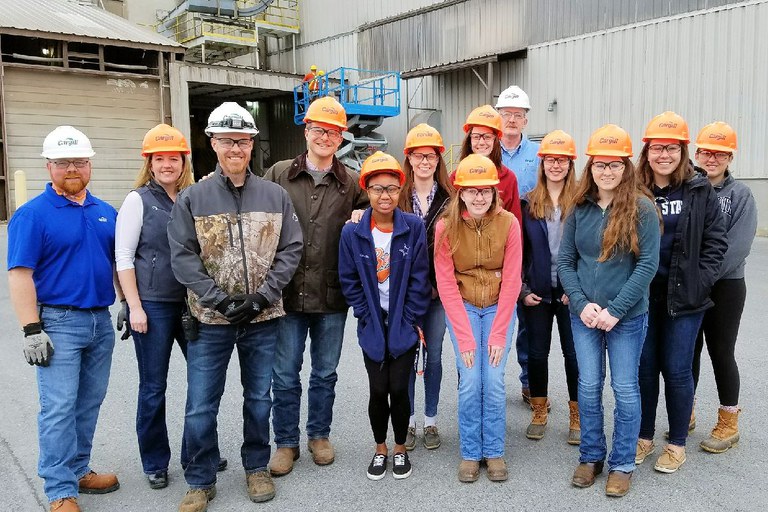Posted: April 17, 2018
Students in the equine nutrition course learned about equine products and career opportunities.

Visitors to Cargill, from left, Corey Ervay, Heather Layton, Chad Showers, Burt Staniar, Darian Coleman, Rebekah Sheridan, Sarah Haunstein, Brittany Miller, Hannah Taylor, Melissa Cluck, Sarah Rassler, and Rachel Higgins.
Last week, Animal Science students from Dr. Burt Staniar's Equine nutrition course visited Cargill's Feed Production Facility in Lebanon, PA, learning about the wide range of equine feed products made there, with a focus on Cargill's attention to food safety.
In addition to having discussions with many Cargill personnel, students toured the plant and saw first-hand the procedures in place to ensure the quality and safety of the feed. They also gained an important perspective on the diversity of employment opportunities available in the field of animal feed production.
Staniar said, "One of my primary objectives is to expose students to personnel and facilities that are excellent representations of what is being accomplished in the field of horse feed production." He noted that following the trip many of the students commented on the complexities of the feed production process and the specialized expertise of the employees at the Cargill facility that enables that mill to produce quality products.
Dr. Terry Etherton, Head of the Department of Animal Science, said, "We are grateful to Burt and to Cargill's leaders for making this wonderful experience available to our students. It is very valuable for them to learn of career opportunities and to observe first hand a complex operation that provides quality products for the equine industry."
Gene Coy, plant manager, welcomed the students and led the plant tour along with his management team. As they toured, students had in-depth discussions of all the procedures in place to ensure food safety throughout the mill, led by Safety Officer Corey Ervay.
Heather Layton, Cargill's Equine Territory Manager for Pennsylvania and Delaware, provided an overview of the some of the horse feed products manufactured at the Lebanon facility and pointed out the importance of quality ingredients and careful production to manufacturing a superior product for horses.
Chad Showers, the assistant plant manager, provided an excellent overview on ingredient logistics and feed production. Students were impressed with the level of automation in the mill, highlighted by the micronutrient management, as well as the bagging and stacking operations.
After the tour, students had lunch with Layton who discussed her own path to a career working in the equine feed industry. She highlighted the importance of communication skills and building relationships with people in various fields. Students talked to her about some of their own ideas about careers and asked questions about current issues in the horse feed industry.
Staniar noted, "A trip like this, near the end of a several month course in which we've been talking about horse nutrition in the classroom, really helps to put those lectures in context. I want my students to see and experience what's happening in the industry."
This trip was funded by the Department of Animal Science, and is one of several industry visits made as part of equine courses at Penn State to help students understand the scope and importance of the industry.

